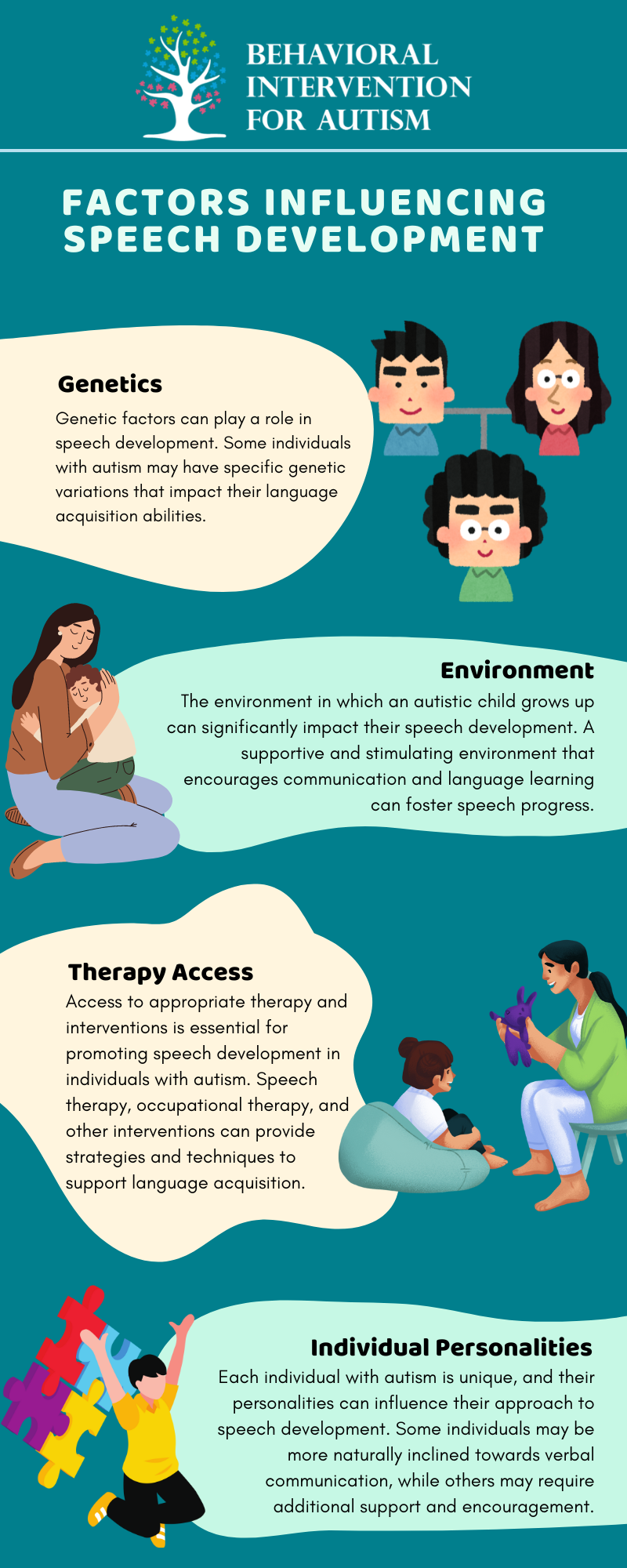
Table of Contents
Acquiring language skills is a significant milestone for all children, including those with autism. The ability to communicate effectively through spoken language opens up opportunities for social interaction, self-expression, and learning.
According to research, acquiring useful language skills by age 5 is a strong predictor of positive outcomes in individuals with Autism Spectrum Disorder (ASD). In-home ABA Therapy can play a crucial role in helping children with ASD develop these essential language skills.
Language acquisition enables individuals with autism to express their needs, thoughts, and emotions. It also plays a crucial role in academic success and the development of cognitive abilities.
But what if your child isn’t talking yet? How will you be able to tell whether they’re ready or not? That’s what we’re going to find out here.
Positive Indicators of Speech Progress
As a parent or caregiver of an autistic child, it is natural to wonder about their speech development and look for signs of progress. While every child is unique, certain positive indicators can suggest your autistic child is on the path to talking.
In this section, we will explore three key indicators that will tell the speech progress of a child with autism.
Increased Vocabulary
Acquiring a diverse vocabulary is an essential component of language development. For autistic children, an increase in vocabulary can be a positive sign that they are making progress towards speech.
As much as possible, keep an eye out for new words your child uses or understands. This can include nouns, verbs, adjectives, and other parts of speech. As their vocabulary expands, their ability to express themselves and understand others will also improve.
Improved Communication Skills
Beyond vocabulary, improved communication skills are crucial for autistic children as they work towards fluent speech.
Fluent speech in autistic children might differ from what you would expect. Look for signs that your child’s communication skills are improving, such as better sentence structure or grammar usage, more expressive tones, or reduced echolalia (repetitive speech patterns).
These are all positive indicators that your child is making progress toward fluent speech.
Non-Verbal Communication
Non-verbal communication can be an early sign that an autistic child may soon start talking.
Many children with autism rely on non-verbal communication, such as gestures, facial expressions, and body language, to express themselves before they develop verbal language skills. Pay attention to any increased non-verbal communication your child exhibits, as it can indicate their readiness to express themselves verbally. Non-verbal communication often precedes verbal communication development.
By closely observing your autistic child’s communication skills, you can identify positive indicators of progress toward fluent speech. Remember, progress may occur at different rates for each child, so be patient and supportive.
If you have concerns about your child’s speech development, seeking professional guidance from therapy and support services can provide valuable assistance. Creating a communication-rich environment and using evidence-based strategies can also nurture and support your child’s verbal skills.
Early Signs of Verbal Communication
For parents and caregivers of individuals with autism, understanding the early signs of verbal communication can be both exciting and encouraging. While every child develops at their own pace, certain indicators may suggest an autistic child is on the path to speaking.
In this section, we will explore two early signs of verbal communication, namely:
Imitation of Sounds and Actions
One of the early signs that an autistic child may soon start talking is their ability to imitate sounds and actions.
Autistic children often observe their surroundings and may attempt to replicate sounds they hear or actions they see. This imitation is a positive sign that they are actively engaging with their environment and beginning to explore the world of verbal communication.
By imitating sounds and actions, they are taking important steps toward developing their own verbal skills.
As a parent or caregiver, you can encourage and support this imitation by providing opportunities for your child to observe and interact with sounds and actions. Singing songs, making animal sounds, or engaging in interactive play can be effective ways to stimulate their interest and encourage their imitation skills.
Remember, each child is unique, so be patient and provide a supportive environment for their exploration.
Following Verbal Instructions
Another early sign that an autistic child may be ready to express themselves verbally is their ability to comprehend and follow simple verbal instructions.
Understanding and responding appropriately to questions or instructions demonstrate their growing understanding of language. This is an important building block for expressive communication.
To assess your child’s ability to follow verbal instructions, you can start by giving them simple tasks or requests. For example, asking them to pick up a toy or point to a specific object. Observe how they respond and if they demonstrate an understanding of the instructions.
Positive responses indicate that they are ready to take the next steps in verbal communication.
Factors Influencing Speech Development
Now that we’ve covered the signs you should watch out for first, let’s talk about the four main factors that can influence the speech development of autistic children. These are as follows:
Providing a nurturing environment, accessing therapy and support, and being patient and encouraging can all contribute to fostering speech progress in individuals with autism.
Remember, every child with autism has unique needs and abilities. As such, it’s crucial to provide individualized support and create a nurturing environment that promotes speech development.
Sources:
https://getgoally.com/blog/signs-your-autistic-child-will-talk
https://otsimo.com/en/will-nonverbal-autistic-child-speak
https://www.carolynsaunders.com/blog/will-my-nonverbal-autistic-child-ever-talk
https://www.innovativeinterventionsnj.com/post/7-key-signs-that-your-autistic-child-will-talk
- Florida Senate Backs Autism Support Bill for Families - February 19, 2025
- Key Questions to Ask an ABA Provider Before Enrolling in Florida - February 19, 2025
- 8 Essential Autism-Friendly Travel Tips for a Stress-Free Trip - February 18, 2025




